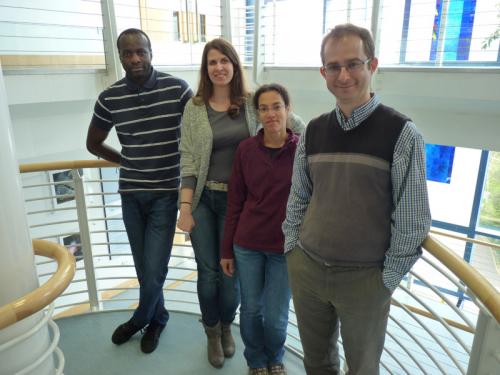
Karim Labib Joins MRC Protein Phosphorylation & Ubiquitylation Unit
We are delighted to announce that Karim Labib and his current lab, consisting of Pedro Nkosi (Senior Scientific Officer), Marija Maric (PhD student) and Cecile Evrin (postdoc), have joined the MRC Protein Phosphorylation and Ubiquitylation Unit (MRC-PPU). Karim will take up a senior group leader position within the MRC-PPU and he will also become Dundee University's Professor of Genome Integrity.
Karim has relocated his laboratory from the CRUK Paterson Institute in Manchester, where he has undertaken ground-breaking work on the the mechanisms by which DNA is replicated and faithfully maintained during the cell division cycle, using an elegant combination of genetics and biochemistry.
Karim has made some seminal contributions to the genome stability and cell cycle fields, including the identification and characterisation of the Replisome Progression Complex, a large protein machine that drives progression of the replication fork. He discovered that the Mcm2-7 proteins provide helicase activity to the replication fork, and went on to show that the Mcm2-7 proteins, along with their activating proteins Cdc45 and GINS, comprise the core of the Replisome Progression Complex.
Karim has also investigated how the Replisome Progression Complex is assembled and what happens when replication forks are stalled. He has also challenged the dogma that the activity of checkpoint kinases is required to prevent disassembly of the replication fork proteins.
More recently Karim has identified new roles for cell cycle kinases and ubiquitin ligases in stabilising the replisome and in regulating mitosis. One of Karim's priorities and main reasons for relocating his laboratory to the MRC-PPU will be to focus in much more depth on how ubiquitylation and phosphorylation control the replisome. He will also be exploiting our expertise and technologies to extend some of his research from yeast to the mammalian system. Karim will also pursue his important work in dissecting the fundamental mechanisms that underpin genome integrity.
Karim has relocated his laboratory from the CRUK Paterson Institute in Manchester, where he has undertaken ground-breaking work on the the mechanisms by which DNA is replicated and faithfully maintained during the cell division cycle, using an elegant combination of genetics and biochemistry.
Karim has made some seminal contributions to the genome stability and cell cycle fields, including the identification and characterisation of the Replisome Progression Complex, a large protein machine that drives progression of the replication fork. He discovered that the Mcm2-7 proteins provide helicase activity to the replication fork, and went on to show that the Mcm2-7 proteins, along with their activating proteins Cdc45 and GINS, comprise the core of the Replisome Progression Complex.
Karim has also investigated how the Replisome Progression Complex is assembled and what happens when replication forks are stalled. He has also challenged the dogma that the activity of checkpoint kinases is required to prevent disassembly of the replication fork proteins.
More recently Karim has identified new roles for cell cycle kinases and ubiquitin ligases in stabilising the replisome and in regulating mitosis. One of Karim's priorities and main reasons for relocating his laboratory to the MRC-PPU will be to focus in much more depth on how ubiquitylation and phosphorylation control the replisome. He will also be exploiting our expertise and technologies to extend some of his research from yeast to the mammalian system. Karim will also pursue his important work in dissecting the fundamental mechanisms that underpin genome integrity.

